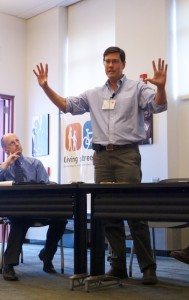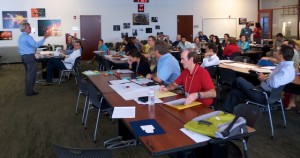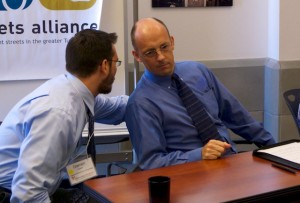
A federal-funding workshop hosted in Tucson brought local, state and national bicycling and walking advocates together on Friday.
The Action 2020 Workshop, which is a collaboration between the League of American Bicyclists and the Alliance for Biking & Walking — and was hosted by the local advocacy group Living Streets Alliance — was designed to educate advocates and public officials who want to get federal money for biking and walking projects.
Andy Clarke, the LAB president, said there are many different types of federal money, but often state and local advocates aren’t aware of them.
“As a perfect example,” Clarke said. “Arizona has a fairly high crash rate and fatality rate for bicyclists and pedestrians when you look at the national standards. Arizona [Department of Transportation] has a federally funded program called the Highway Safety Improvement Program that gets tens of millions a year for safety improvements. Barely a penny has been spent on about one-fifth of the crash problem in Arizona, which is cyclists and pedestrians.”
He said Tucson seemed like a great place to launch the workshop, which included information sessions about alternative funding sources, presentations by national advocates, a panel with local and state politicians and a walking tour to help put the information to practical use.
“We thought Tucson was the perfect place to launch the program because of the amazing people that are already involved here,” Clarke said. “As we have already seen this morning, even here — where people are so plugged in and where there is a great network and where the vision for a more bike-friendly and pedestrian-friendly Tucson is alive and well — even here we are discovering that these programs are not being used and that people don’t know they exist. It is proving to be a timely course.”

Tom Thivener, the City of Tucson’s bicycle and pedestrian program manager, said he was really enthusiastic about what he had already learned.
“It is really enlightening having all these leaders from the national advocacy scene here,” he said. “I’ve definitely learned about a lot of new funding sources that can be applied. I still haven’t figured out how I am going to get the man power to help corral all these funds, so I think staffing is something that needs to be talked about more. We can do a lot more. We just need more man power to do it.”
Everyone seemed to agree that just getting advocates and officials from around the state in the same room was a great step forward.
“What has been the most exciting for me to see is just in the course of this morning, people making connections and trying to answer questions for each other in the audience.” Living Streets Alliance president, Emily Yetman said. “One person will bring up an issue they are having in another part of the state and someone from ADOT will stand up and say, ‘Hey I’m the guy you need to talk to.'”
 Matt Zoll, Pima County’s bicycle and pedestrian program manager, was also pleased to see everyone in the same room.
Matt Zoll, Pima County’s bicycle and pedestrian program manager, was also pleased to see everyone in the same room.
“It is a tremendous way to bring people together,” he said. “I think we need to do more of this. It is a great way to share ideas.”
Thivener said getting so many people in one room created a lot of positive energy.
“I think this energy is going to lead to a lot of positive change and help get Tucson to that critical mass.”
